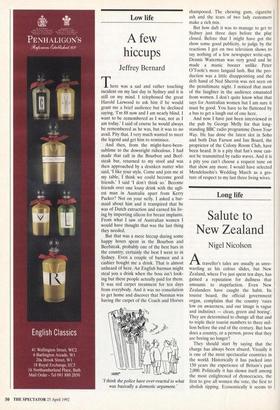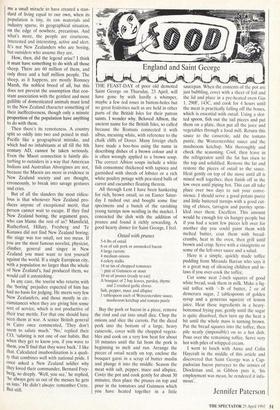Long life
Salute to New Zealand
Nigel Nicolson
They should start by saying that the charge has always been absurd. Visually it is one of the most spectacular countries in the world. Historically it has packed into 150 years the experience of Britain's past 2,000. Politically it has shown itself among the most enlightened of democracies, the first to give all women the vote, the first to abolish tipping. Economically it seems to me a small miracle to have created a stan- dard of living equal to our own, when its population is tiny, its raw materials and industry sparse, its geographical situation, on the edge of nowhere, precarious. And what's more, the people are courteous, interested and interesting, active and alert. It's not New Zealanders who are boring, but outsiders who assume they are.
How, then, did the legend arise? I think it must have something to do with all those sheep. There are 60 million of them, and only three and a half million people. The sheep, as it happens, are mostly Romney Marsh, the noblest breed of all, but this does not prevent the assumption that con- stant association with the gentlest and most gullible of domesticated animals must lend to the New Zealand character something of their ineffectiveness, though only a minute proportion of the population have anything to do with them.
Then there's its remoteness. A country split so oddly into two and poised in mid- Pacific like a geographical mistake, and which had no inhabitants at all till the 8th century AD, cannot be taken seriously. Even the Maori connection is faintly dis- turbing to outsiders in a way that American Indians and Australian Aborigines are not, because the Maoris are more in evidence in New Zealand society and are thought, erroneously, to break into savage gestures and cries.
But of all the slanders the most ridicu- lous is that whenever New Zealand pro- duces anyone of exceptional merit, that person cannot wait to escape. If they find New Zealand boring, the argument goes, who can blame the rest of us? Mansfield, Rutherford, Hillary, Freyberg and Te Kanawa did not find New Zealand boring; the stage was too small, not too mean. If you are the most famous novelist, physicist, climber, general and singer in New Zealand you must want to test yourself against the world. If a single European city, with a population no larger than the whole of New Zealand's, had produced them, we would call it astonishing.
In any case, the tourist who returns with the 'boring' prejudice expected of him has had no basis for judging. He meets very few New Zealanders, and those mostly in cir- cumstances when they are giving him some sort of service, which is not productive of their true mettle. For that one should have seen them at war. A senior British general in Cairo once commented, 'They don't seem to salute much.' No,' replied their CO, 'saluting is not one of our habits. But when they get to know you, if you wave to them, you'll find that they wave back.' I like that. Calculated insubordination is a quali-
ty that combines well with national pride. I once asked a New Zealand, soldier why they loved their commander, Bernard Frey- berg, so deeply. 'Well, you see,' he replied, 'he always gets us out of the messes he gets
into.' nto.' He didn't always: remember Crete. But still.



























































 Previous page
Previous page